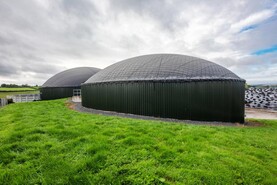Theresa MAy emerged from her late night discussions with the EU in Strasbourg declaring that she has secured the legally binding changes she wanted to the Irish backstop.
It now remains for her to convince enough MPs to vote for her updated Withdrawal Agreement. The mood among staunchly pro-Brexit MPs was at most a willingness to consider the detail before coming to a position, though some seemed prepared to reject it out of hand.
Trade over politics
The issues for farmers on the island of Ireland are not the finer political points and principles of a backstop, but rather how trade will be affected.
The backstop was devised as a mechanism where in the event that no long-term deal could be secured by the UK as a whole with the EU, then Northern Ireland alone would remain aligned with the EU customs union and maintain the same production standards as in the EU single market. This was considered politically unacceptable as it differentiated Northern Ireland from the rest of the UK and Theresa May sought to get around that by making the backstop UK wide, not Northern Ireland exclusive.
Many Conservative Party MPs as they felt a backstop that kept the UK aligned with EU customs indefinitely would render Brexit meaningless.
Limited use
The reality is that the backstop that would keep Northern Ireland alone aligned with the rest of the EU and a frictionless border on the island of Ireland is unwanted by anyone, especially farmers.
Over 400,000 pigs from the Republic go north every year, with the same number of lambs and a third of Northern Ireland’s milk coming south.
Doom
If the Irish backstop is ever triggered, Irish agriculture would be doomed. Placing exports to Britain under WTO trade terms or whatever unilateral terms the UK decided upon would place a huge low tariff quota on Irish produce.
Long-term solution
Therefore, farmers thinking commercially should not be obsessed with a backstop exclusively for the island of Ireland. However, the possibility of the entire UK deciding unilaterally to break away from its relationship with the EU that protects against global imports of agri produce is a major worry.
For farmers, it is necessary that a long-term transition is put in place during which the UK will explore its global options and hopefully conclude that a deep relationship that involves customs and standards alignment with the EU is the best option of all.
This, not the assurances of whatever status the UK Prime Minster secured in Strasbourg is what best meets the needs of farmers.
Read more
UK plans to open doors to Brazilian beef
Brexit: Theresa May secures legally binding changes to backstop
Theresa MAy emerged from her late night discussions with the EU in Strasbourg declaring that she has secured the legally binding changes she wanted to the Irish backstop.
It now remains for her to convince enough MPs to vote for her updated Withdrawal Agreement. The mood among staunchly pro-Brexit MPs was at most a willingness to consider the detail before coming to a position, though some seemed prepared to reject it out of hand.
Trade over politics
The issues for farmers on the island of Ireland are not the finer political points and principles of a backstop, but rather how trade will be affected.
The backstop was devised as a mechanism where in the event that no long-term deal could be secured by the UK as a whole with the EU, then Northern Ireland alone would remain aligned with the EU customs union and maintain the same production standards as in the EU single market. This was considered politically unacceptable as it differentiated Northern Ireland from the rest of the UK and Theresa May sought to get around that by making the backstop UK wide, not Northern Ireland exclusive.
Many Conservative Party MPs as they felt a backstop that kept the UK aligned with EU customs indefinitely would render Brexit meaningless.
Limited use
The reality is that the backstop that would keep Northern Ireland alone aligned with the rest of the EU and a frictionless border on the island of Ireland is unwanted by anyone, especially farmers.
Over 400,000 pigs from the Republic go north every year, with the same number of lambs and a third of Northern Ireland’s milk coming south.
Doom
If the Irish backstop is ever triggered, Irish agriculture would be doomed. Placing exports to Britain under WTO trade terms or whatever unilateral terms the UK decided upon would place a huge low tariff quota on Irish produce.
Long-term solution
Therefore, farmers thinking commercially should not be obsessed with a backstop exclusively for the island of Ireland. However, the possibility of the entire UK deciding unilaterally to break away from its relationship with the EU that protects against global imports of agri produce is a major worry.
For farmers, it is necessary that a long-term transition is put in place during which the UK will explore its global options and hopefully conclude that a deep relationship that involves customs and standards alignment with the EU is the best option of all.
This, not the assurances of whatever status the UK Prime Minster secured in Strasbourg is what best meets the needs of farmers.
Read more
UK plans to open doors to Brazilian beef
Brexit: Theresa May secures legally binding changes to backstop






 This is a subscriber-only article
This is a subscriber-only article









SHARING OPTIONS: